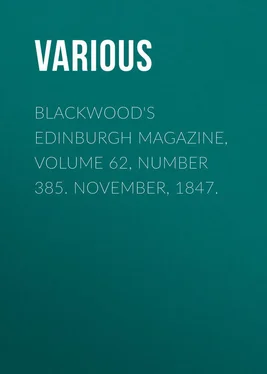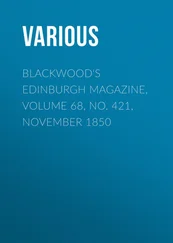Various - Blackwood's Edinburgh Magazine, Volume 62, Number 385. November, 1847.
Здесь есть возможность читать онлайн «Various - Blackwood's Edinburgh Magazine, Volume 62, Number 385. November, 1847.» — ознакомительный отрывок электронной книги совершенно бесплатно, а после прочтения отрывка купить полную версию. В некоторых случаях можно слушать аудио, скачать через торрент в формате fb2 и присутствует краткое содержание. Издательство: Иностранный паблик, Жанр: periodic, foreign_edu, Путешествия и география, на английском языке. Описание произведения, (предисловие) а так же отзывы посетителей доступны на портале библиотеки ЛибКат.
- Название:Blackwood's Edinburgh Magazine, Volume 62, Number 385. November, 1847.
- Автор:
- Издательство:Иностранный паблик
- Жанр:
- Год:неизвестен
- ISBN:нет данных
- Рейтинг книги:4 / 5. Голосов: 1
-
Избранное:Добавить в избранное
- Отзывы:
-
Ваша оценка:
- 80
- 1
- 2
- 3
- 4
- 5
Blackwood's Edinburgh Magazine, Volume 62, Number 385. November, 1847.: краткое содержание, описание и аннотация
Предлагаем к чтению аннотацию, описание, краткое содержание или предисловие (зависит от того, что написал сам автор книги «Blackwood's Edinburgh Magazine, Volume 62, Number 385. November, 1847.»). Если вы не нашли необходимую информацию о книге — напишите в комментариях, мы постараемся отыскать её.
Blackwood's Edinburgh Magazine, Volume 62, Number 385. November, 1847. — читать онлайн ознакомительный отрывок
Ниже представлен текст книги, разбитый по страницам. Система сохранения места последней прочитанной страницы, позволяет с удобством читать онлайн бесплатно книгу «Blackwood's Edinburgh Magazine, Volume 62, Number 385. November, 1847.», без необходимости каждый раз заново искать на чём Вы остановились. Поставьте закладку, и сможете в любой момент перейти на страницу, на которой закончили чтение.
Интервал:
Закладка:
The French revolutionary war naturally involved the Dutch in the general conquest of the Netherlands. The rash republicanism of the factions which had expelled the stadtholder, was speedily punished by the plunderings and corruptions of their new allies, and the insolent and atrocious annexation of Holland to the French empire was followed by the additional calamity of a war with England, which stripped her of all her colonies. An English expedition sailed for Java, stormed its defences, and took possession of Batavia and the Dutch possessions on the island in 1811. An English government was established, Sir Stamford Raffles was placed at its head, and Java with its infinite natural resources and incomparable position, promised to become one of the most important of the Indian colonies of England.
But at the peace of Paris, in 1815, the British policy, which was directed to the conciliation of the Dutch, and the erection of Holland into a barrier against France, induced the restoration of Java. This act of liberality met with strong remonstrance; and a memorial from the British Resident placed in the fullest point of view the probable value and actual advantages of retaining Java. But the policy was already determined on. It is said that, on the Resident's return to England, he found his original memoir in some of the depositories of strangled remonstrances, with its seals unbroken. The reason however, may have been, that the restoration was un fait accompli .
But the sacrifice was useless. The sudden whim for Radicalism at home, and revolution abroad, which seized British statesmen in the first frenzy of the Reform Bill, instead of punishing the revolt of the Belgians, suffered the dismemberment of the kingdom of the Netherlands; a measure of the most shortsighted policy, which has now placed Belgium in the most serious hazard of being absorbed by its all-swallowing neighbour France, on the first convulsion of the continent. But, as England has no inclination to disturb her neighbours, and is never guilty of that last atrocity of nations, breach of treaties; the great colony is still left in Dutch hands, and will be left, until some new folly compels its resumption.
Java is a noble island; singularly shaped, for its length is about four times its average breadth; six hundred miles by about one hundred and fifty. Its whole extent is fifty thousand square miles, or nearly the size of England. But its fertility of all kinds is incalculably superior. From its diversity of climate, it is obviously capable of raising European as well as tropical productions. Its climate, too, is healthful, notwithstanding the illfame of Batavia. Even there, the inhabitants have at length learned to prefer fields to swamps, and fresh air to the vapour of ditches; for the greater portion have either gone into the interior, or live in suburbs extending to considerable distances. In fact, the original fen-loving Hollander has passed away, and another generation has sprung up, which prefers health and long life even to dollars and dyspepsia. Yet, what is Java, to the islands almost within her view? To Sumatra, with her one hundred and sixty thousand square miles, and Borneo, with her two hundred and eighty-six thousand – almost a continent; and those vast territories not wild and barren plains, like the huge spaces of Australia, nor frozen for one half of the year, like our settlements in America, but overflowing with the richest vegetable products of the earth, covered with herds of the buffalo and other cattle, and sheeted with forests up to the summits of their ranges of mountains. What their mineral wealth may be, remains for European investigation; but gold has been found in their rivers, and from the various heights of their hills, we may fairly suppose them, in some instances at least, metalliferous.
Yet Java – of the same extent with England, produce almost spontaneous, without any endemic disease, and with the dissensions of the natives kept down by the Dutch authority – is calculated to have but nine millions of people, about less than half of the souls of England. So little does population depend upon plenty, climate, or even upon peace. The Dutch government appears to be honest, and the reverse of severe; its offices are well conducted, its salaries seem to be substantial and sufficient, and its general rule of the island appears to be directed to suppressing violence among the native tribes.
But the sudden impulse which now urges European enterprise to the extremities of the earth; which sends expeditions to invade the territories of the seal and the whale at the South Pole, and plants cities within the gales of the arctic snows, must at length turn to the golden islands of the Indian Ocean. There, new powers will be awakened, new vigour will take place of old stagnation, and those matchless portions of the globe will give their treasures to the full use of man.
As it was determined to refit the ship in Java, time was given for the curiosity of Mr Jukes and the officers to employ itself in examining the interior. After various difficulties, connected with official forms in passing through the different Dutch provinces, – in which, however, it is only justice to the governors to acknowledge, that in general they conducted themselves with much civility, – the party, consisting of four, at length set out. They found post-houses at every half dozen miles apart, with a good carriage-road; they passed by a succession of villages, through a flat country covered with rice and sugar-cane, interspersed with large belts of wood. But those were villages concealed by groves of fruit trees. On their way, they stopped to see a sugar manufactory – a Belgian partnership. The house was large and handsome, and the establishment complete. This is a new manufacture in Java. They were now running along the northern coast of the island, and after a drive of forty miles in six hours, they arrived at Passarouan, which they unexpectedly found to be a large town with several wide streets, Chinese houses in court yards, and European residences, having lawns and carriage drives. The native Javanese resided in separate quarters, each of which is surrounded by a fence of bamboo paling, or a wall. We should conceive these people to lead a primitive and pleasant life, for in those quarters the bamboo houses seemed to be scattered indiscriminately under the shade of bananas, cocoa nuts, and other fruit trees.
The Dutch residents or governors, appear also to be very much at their ease. The salary of the resident of Passarouan, though nominally but £1,500 a-year, amounts to £3,400 sterling besides, as it is the custom that each resident has a per centage on the coffee, sugar, tobacco, rice, &c., raised in his district. An income of this order, when we consider the cheapness of all the necessaries of life in the island, must be regarded as a very liberal provision.
They saw, as they passed through the rice fields, a curious but simple contrivance for preserving the growing crops from the flocks of sparrows. In the centre of the fields small sheds were erected on posts, from which strings with feathers radiated in every direction. A boy, or girl, was stationed in the shed to keep the strings in motion, in order to frighten away the birds.
On the road they passed a large market, crowded with people. They found rows of stalls or long sheds, in some of which European articles, such as cutlery and drapery, were offered for sale; in others were drugs, fruit, confectionery, or salt fish. The traffickers, too, seemed to be enjoying themselves, as some of the stalls had benches before them, on which sat people drinking coffee, and eating rice, hot sweet potatoes, fruit, and sweet-meats. Their next stage was a town named Probolingo, and they were again surprised at the extent of a place perfectly new to them. Broad roads with avenues of lofty trees intersected each other at right angles, bounded by the fences of the native Kampangs, or Javanese quarters, which looked like large orchards. There were also at intervals European houses of good size and appearance, each in its own grounds, with a carriage-drive under the trees. They found, also, the still rarer evidence of a comfortable condition of general intercourse, – a good hotel; of which the master, however, spoke "but little English." Our curiosity is left in doubt, whether his accomplishments were Dutch or Javanese.
Читать дальшеИнтервал:
Закладка:
Похожие книги на «Blackwood's Edinburgh Magazine, Volume 62, Number 385. November, 1847.»
Представляем Вашему вниманию похожие книги на «Blackwood's Edinburgh Magazine, Volume 62, Number 385. November, 1847.» списком для выбора. Мы отобрали схожую по названию и смыслу литературу в надежде предоставить читателям больше вариантов отыскать новые, интересные, ещё непрочитанные произведения.
Обсуждение, отзывы о книге «Blackwood's Edinburgh Magazine, Volume 62, Number 385. November, 1847.» и просто собственные мнения читателей. Оставьте ваши комментарии, напишите, что Вы думаете о произведении, его смысле или главных героях. Укажите что конкретно понравилось, а что нет, и почему Вы так считаете.












